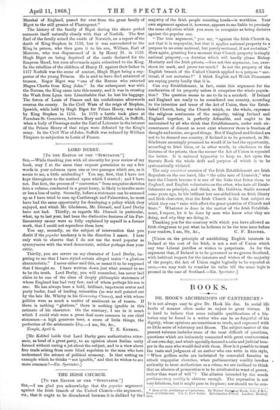LORD DERBY.
[To THE EDITOR OF THE " SPECTATOR."] SIR,—While thanking you with all sincerity for your review of my book, may I at the same time request permission to say a few words in your columns upon one or two passages which are, as it seems to me, a little misleading ? You say, first, that I have not kept throughout to the method upon which I started ; and I have not. But first, the process of " conversion " from magazine sketches into a volume, conducted in a great hurry, is likely to involve more or less a loss of unity. Secondly, before a statesman can be summed up as I have tried to sum up Castlereagh and Palmerston, he must have had the same opportunity for developing a policy which they enjoyed, and which Mr. Gladstone, Mr. Disraeli, and Lord Derby have not had. Thirdly, as regards Mr. Disraeli in particular, what, up to last year, had been the distinctive features of his Par- liamentary career were so fully explained by myself in a former work, that I could not reproduce them here.
You say, secondly, on the subject of intervention that you doubt if the popular tendency is in the direction I assert. I here only wish to observe that I do not use the word popular as synonymous with the word democratic, neither perhaps does your critic.
Thirdly, you are severe on my character of Lord Derby, im- puting to me that I have styled certain alleged traits " a glorious characteristic." I never either said this, or meant it to be supposed that I thought so. I have written down just what seemed to me to be the truth. Lord Derby, you will remember, has never laid claim to be one of the class of deeply philosophic statesmen of whom England has had very few, and of whom perhaps his son is. one. He has always been a bold, brilliant, impetuous orator and party leader, fond of leading minorities (as was well pointed out by the late Mr. Whitty in his Governing Classes), and with whom politics were as much a matter of sentiment as of reason. If there is nothing "glorious," there is nothing ignoble in this estimate of his character. On the contrary, I see in it much which I could wish were a great deal more common in our chief statesmen—a high generous tone, a scorn of little things, the perfection of the aristocratic am, Sir, &c., [Mr. Kebbel holds that Lord Derby gave authoritative utter- ance, as head of a great party, to an opinion about Italian unity formed without caring a jot about the subject, and to a view about free trade arising from mere blind repulsion to the man who best understood the science of political economy. Is that setting an example which he thinks " not ignoble," and that he wishes to see more common?—ED. Spectator.]


































 Previous page
Previous page